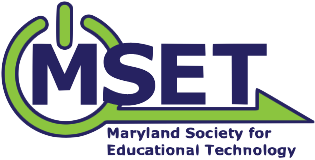|
September 2022:Digital Learning Showcase |
Featured Educator: Justin Patterson |
Creating game simulations elevate learning |
- Patterson's interactive media production (IMP) is like no other
"Because they are empowered to be creative, students are experiencing higher levels of confidence, self-esteem, and pride as they see their work being used school wide." - Amanda Furst, Assistant Principal Chesapeake High School Essex, Md. -- The Maryland Society for Educational Technology (MSET) is proud to announce its September 2022 Digital Learning Showcase Recipient Justin Patterson, an interactive media production (IMP) instructor at Chesapeake High School in Baltimore County Public Schools. Patterson and Chesapeake High School was fortunate to be selected as a research grant recipient of John Hopkins University’s Applied Physics Lab. The state of the art facility offered opportunities beyond imaginable and Patterson was the right person to move the project forward long after the grant period expired too. He decided to focus on developing an experience for students around 2D and 3D graphics and has expanded his program ever since. “I have always enjoyed computer graphics and tinkering around with coding,” Patterson explained how he grew into his current role. “I knew there was so much potential available in this lab. We added simulations and elevated our graphics game into a more cartoon world. Kids absolutely love it.” Patterson’s students participate in developing authentic simulated environments to tackle real-world problems. For instance one activity he described included a simulation where a firefighter enters a burning building. In this simulation, students create the 3D structure that is burning as well as all the features within the building. In addition, Patterson's students code the characters' movements navigating through the building. “Each time students participate in our simulations we are giving them chances to develop skills like failure and perseverance. Failure is not a punishment, but a new opportunity to fix a mistake in their work,” he indicated as many of the simulations take a lot of effort and he is proud his students rise to the challenge every time. As much fun as Patterson is having working with his students, many of his students are realizing graphic arts, coding, and cyber security – all of which are being practiced in the IMP classroom – are plausible career options in the future. Each student is building their resume that will go far beyond Chesapeake High School. “Students are experiencing what it means to work as an integrated team producing games that align with customer needs. They are immersed in skill-based learning that supports the various needs present in the educational games they are building,” Chesapeake High School Assistant Principal Amanda Furst shared. “Because they are empowered to be creative, students are experiencing higher levels of confidence, self-esteem, and pride as they see their work being used school wide.” Building More Than a Classroom In education, it’s not uncommon to hear about the power of transdisciplinary learning, but it’s often a lofty goal to achieve. However, this is where Patterson shines at Chesapeake High School. The virtual world(s), simulations, and games that Patterson and his IMP students create are designed specifically to support the entire Chesapeake High community, from helping teachers enhance lessons to immersing stakeholders in a game to explore the educational options within the magnet program. Patterson is not afraid to take risks and is agile in response to the barriers that ultimately present themselves. His unwavering commitment to innovation allows for students and teachers to thrive. Fort McHenry Becomes a Virtual World One of the most unique accomplishments coming out of Patterson’s classroom is his work with developing a virtual Fort McHenry, a historical site best known for it defended the Baltimore harbor from an attack by the British navy from the Chesapeake Bay during the War of 1812. Patterson and his students work has resulted in customized simulations that have been created for science and business teachers with the hopes of expanding this initiative by on-boarding math and social studies this year. Patterson’s success has garnered some notices from colleagues near and far as he will be sharing his work with his Fort McHenry simulations at the Magnet Schools of America annual conference. Giving Credit Back to BCPS The 16 year veteran gives many thanks to the Baltimore County Public Schools' Game Development Competition and Congressional App Challenge because it continues to give his students an authentic task to apply the principles from his course. Busy teaching four courses a day, Furst explained the program of study in Patterson’s courses is well developed and builds upon previous courses magnificently. Freshmen learn the basics of art principles and elements, color theory, and how they play into character design. These students then develop their characters into vector images to begin the process of coding. In sophomore courses, students animate game characters with attention to the 12 principles of animation and then will code the animations to be manipulated via a state machine. By junior and senior years, students are working on 3D game development and learning the basics of modeling, texturing, and rigging. “My students want to develop these skills because they see the job opportunities opening up, even in their local community. They now believe they can make a career out of it,” Patterson stated. About Digital Learning Showcase MSET is taking the opportunity to highlight best practices in classroom teaching, leading, and learning with educational technology from around the state of Maryland. The goal is to spotlight innovations of members and nonmembers throughout different public and private school settings. Each month teachers, school leaders, and community members are asked to nominate individuals who support innovation and educational technology in a school setting. MSET is non-profit organization with the purpose of promoting the improvement of the teaching-learning process through effective technology integration into all curricular areas as well as fostering and promoting excellence technology in education. MSET is an affiliate of the International Society for Technology in Education (ISTE), a leading international network for technology professionals. |

